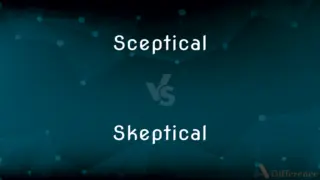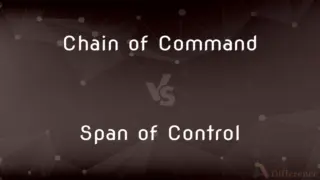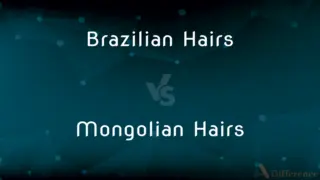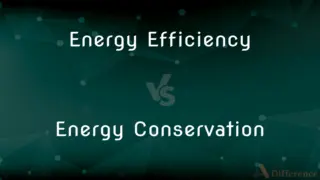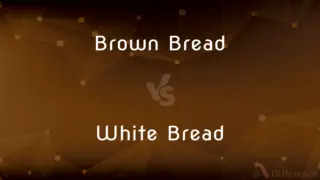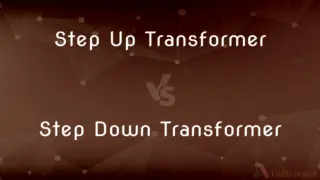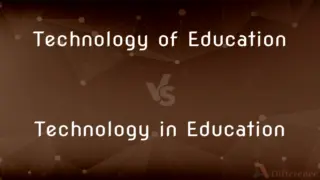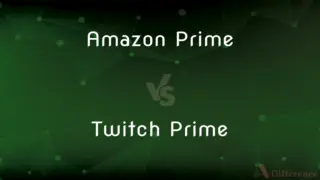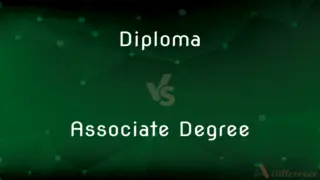Enchantress vs. Witch — What's the Difference?
By Tayyaba Rehman & Urooj Arif — Updated on April 8, 2024
An enchantress is often portrayed as a woman with magical abilities focused on seduction and manipulation, while a witch is typically seen as a practitioner of witchcraft, with a broader range of magical powers.

Difference Between Enchantress and Witch
Table of Contents
ADVERTISEMENT
Key Differences
An enchantress, in folklore and fantasy, is depicted as a woman who uses her magic primarily to enchant or beguile, employing charms and spells to seduce or control others. On the other hand, a witch is generally described as someone, usually a woman, who practices witchcraft, using spells, potions, and magical rituals for a variety of purposes, which can be either benevolent or malevolent.
The term "enchantress" conveys a sense of allure and charisma, suggesting that her magical abilities are often tied to her physical attractiveness and ability to influence emotions and desires. Whereas, the term "witch" does not inherently carry implications about physical appearance or methods of influence, focusing more on the craft and practice of magic itself.
Enchantresses are often depicted in myths and stories as solitary figures, using their powers for personal goals or larger schemes that involve manipulation of powerful individuals or heroes. Witches, however, can be solitary or part of covens, with their practices ranging from healing and protection to curses and hexes, reflecting a wider community and diversity in their magical dealings.
The portrayal of enchantresses in literature and media often leans towards the romantic or erotic, emphasizing their roles as temptresses or femme fatales. In contrast, witches are portrayed in a wide array of representations, from the evil hag in fairy tales to wise women and guardians of ancient knowledge, showing a broader spectrum of moral and ethical alignments.
In many cultures, the distinction between an enchantress and a witch can blur, as both are seen as wielders of supernatural powers. However, the societal reaction to each can differ significantly, with enchantresses sometimes being viewed with a mix of fear and fascination, while witches may be respected, feared, or persecuted, depending on the cultural context and historical period.
ADVERTISEMENT
Comparison Chart
Primary Abilities
Seduction, manipulation through magic
Broad range of magical powers
Implication
Allure and charisma
Practice of witchcraft
Typical Portrayal
Femme fatale, seductive
Varied: from evil hag to wise woman
Social Role
Often solitary, influencing individuals
Solitary or in covens, community-oriented
Cultural Perception
Feared and fascinated
Feared, respected, or persecuted
Compare with Definitions
Enchantress
Uses magic for seduction and control.
Tales often speak of an enchantress manipulating heroes with her charm.
Witch
A practitioner of witchcraft.
The village witch was sought for her knowledge of herbs and healing.
Enchantress
Depicted as alluring and charismatic.
The enchantress in the story was as captivating as she was mysterious.
Witch
Can be benevolent or malevolent.
Some witches use their powers to protect their communities, while others may curse those who wrong them.
Enchantress
Focused on personal goals or power.
An enchantress may seek to use her powers to gain influence over kingdoms.
Witch
Portrayed in various ways across cultures.
Witches have been depicted as wise healers, mischievous hags, and everything in between.
Enchantress
A woman with the power to enchant.
The enchantress used her beauty and spells to bewitch the prince.
Witch
Engages in a wide range of magical practices.
Witches in folklore could cast spells, brew potions, and summon spirits.
Enchantress
Seen in myths as solitary figures.
The legend describes an enchantress living alone, weaving spells by moonlight.
Witch
Often part of a coven or magical community.
She joined a coven to share knowledge and rituals with other witches.
Enchantress
A woman who practices magic; a sorceress.
Witch
A person, especially a woman, claiming or popularly believed to possess magical powers and practice sorcery.
Enchantress
A woman who uses magic to put someone or something under a spell.
Witch
A believer or follower of Wicca; a Wiccan.
Enchantress
A woman of great charm or fascination.
Witch
(Offensive) An old woman considered to be ugly or frightening.
Enchantress
A woman, especially an attractive one, skilled at using magic; an alluring witch.
Witch
A woman considered to be spiteful or overbearing.
Enchantress
A beautiful, charming and irresistible woman.
She was the enchantress of men's hearts.
Witch
(Informal) A woman or girl considered to be charming or fascinating.
Enchantress
A femme fatale.
His desire for that enchantress led him to financial ruin!
Witch
One particularly skilled or competent at one's craft
"A witch of a writer, [she] is capable of developing an intensity that verges on ferocity" (Peter S. Prescott).
Enchantress
A woman versed in magical arts; a sorceress; also, a woman who fascinates.
Witch
To work or cast a spell on; bewitch.
Enchantress
A woman who is considered to be dangerously seductive
Witch
To cause, bring, or effect by witchcraft.
Enchantress
A female sorcerer or magician
Witch
To use a divining rod to find underground water or minerals; dowse.
Witch
A person who practices witchcraft.
Witch
(now usually particularly) A woman who is learned in and actively practices witchcraft.
Witch
An ugly or unpleasant woman.
I hate that old witch.
Witch
One who exercises more-than-common power of attraction; a charming or bewitching person.
Witch
One given to mischief, especially a woman or child.
Witch
(geometry) A certain curve of the third order, described by Maria Agnesi under the name versiera.
Witch
The storm petrel.
Witch
Any of a number of flatfish:
Witch
Glyptocephalus cynoglossus (Torbay sole), found in the North Atlantic.
Witch
Lepidorhombus whiffiagonis (megrim), found in the North Atlantic.
Witch
Arnoglossus scapha, found near New Zealand.
Witch
The Indomalayan butterfly Araotes lapithis, of the family Lycaenidae.
Witch
A cone of paper which is placed in a vessel of lard or other fat and used as a taper.
Witch
(intransitive) To dowse for water.
Witch
To practise witchcraft.
Witch
(transitive) To bewitch.
Witch
A cone of paper which is placed in a vessel of lard or other fat, and used as a taper.
Witch
One who practices the black art, or magic; one regarded as possessing supernatural or magical power by compact with an evil spirit, esp. with the Devil; a sorcerer or sorceress; - now applied chiefly or only to women, but formerly used of men as well.
There was a man in that city whose name was Simon, a witch.
He can not abide the old woman of Brentford; he swears she's a witch.
Witch
An ugly old woman; a hag.
Witch
One who exercises more than common power of attraction; a charming or bewitching person; also, one given to mischief; - said especially of a woman or child.
Witch
A certain curve of the third order, described by Maria Agnesi under the name versiera.
Witch
The stormy petrel.
Witch
A Wiccan; an adherent or practitioner of Wicca, a religion which in different forms may be paganistic and nature-oriented, or ditheistic. The term witch applies to both male and female adherents in this sense.
Witch
To bewitch; to fascinate; to enchant.
[I 'll] witch sweet ladies with my words and looks.
Whether within us or withoutThe spell of this illusion beThat witches us to hear and see.
Witch
A female sorcerer or magician
Witch
A being (usually female) imagined to have special powers derived from the devil
Witch
An ugly evil-looking old woman
Witch
Cast a spell over someone or something; put a hex on someone or something
Common Curiosities
Are witches always female?
While traditionally female, the concept of witches can include male practitioners, often referred to as warlocks or wizards in various cultures.
How does a witch practice magic?
A witch practices magic through spells, potions, and rituals, with purposes ranging from healing to harm.
Can witches be part of a community?
Yes, witches can be solitary or part of covens, engaging in communal practices and sharing magical knowledge.
Can an enchantress be benevolent?
While enchantresses are often portrayed with manipulative intentions, they can also use their powers for benevolent purposes, depending on the story.
Do enchantresses work alone or in groups?
Enchantresses are typically depicted as solitary figures, focusing on their personal goals or schemes.
How are witches viewed by society?
Witches can be viewed in various ways by society, from feared and persecuted to respected and sought after for their knowledge and powers.
What defines an enchantress?
An enchantress is defined by her use of magic to enchant, seduce, and manipulate, often highlighted by her alluring nature.
What role do enchantresses play in mythology?
In mythology, enchantresses often play the role of temptresses or manipulators, influencing the paths of heroes and kings.
What is the main difference between an enchantress and a witch?
The main difference lies in their focus and portrayal: enchantresses are often focused on seduction and manipulation, while witches have a broader range of magical practices and moral alignments.
Can men be enchantresses?
Traditionally, the term "enchantress" refers to a female figure, but male counterparts with similar powers might be referred to by other terms, such as sorcerers or wizards.
How do cultural perceptions of witches vary?
Cultural perceptions of witches vary widely, from evil beings to protectors of nature, reflecting the diversity of beliefs and attitudes toward magic across different societies.
Is the portrayal of enchantresses always negative?
Not always; while many stories cast enchantresses in a negative light, some portray them as complex characters with motivations beyond mere seduction or evil.
What is the significance of covens for witches?
Covens provide a community for witches to share knowledge, conduct rituals, and support one another in their magical practices and personal growth.
Are there any historical figures considered to be witches?
Yes, throughout history, many individuals have been labeled as witches, often due to their herbal knowledge, healing practices, or involvement in witch trials.
What kind of magic do enchantresses use?
Enchantresses use magic that focuses on enchantment, charms, and spells that influence desire, love, and decision-making.
Share Your Discovery

Previous Comparison
Ally vs. Alliance
Next Comparison
Mace vs. AllspiceAuthor Spotlight
Written by
Tayyaba RehmanTayyaba Rehman is a distinguished writer, currently serving as a primary contributor to askdifference.com. As a researcher in semantics and etymology, Tayyaba's passion for the complexity of languages and their distinctions has found a perfect home on the platform. Tayyaba delves into the intricacies of language, distinguishing between commonly confused words and phrases, thereby providing clarity for readers worldwide.
Co-written by
Urooj ArifUrooj is a skilled content writer at Ask Difference, known for her exceptional ability to simplify complex topics into engaging and informative content. With a passion for research and a flair for clear, concise writing, she consistently delivers articles that resonate with our diverse audience.











